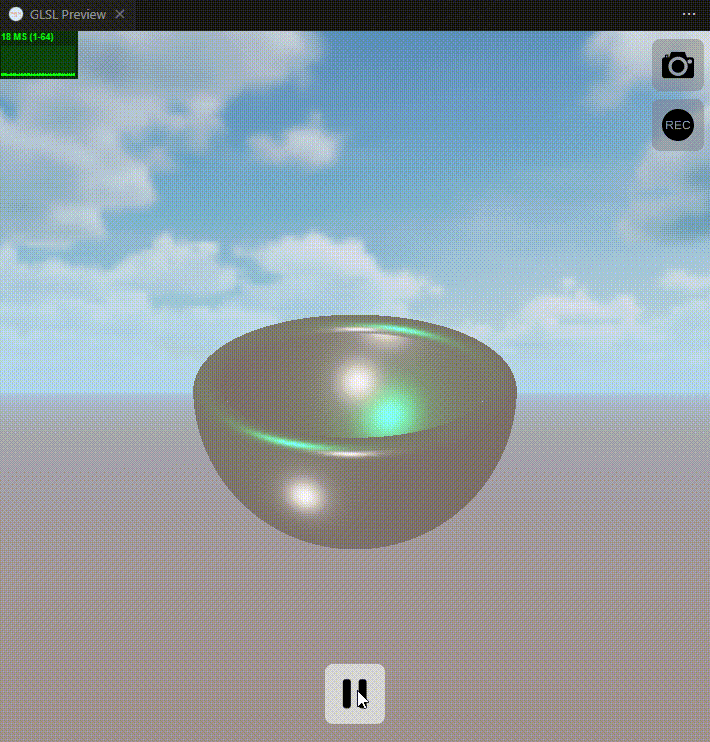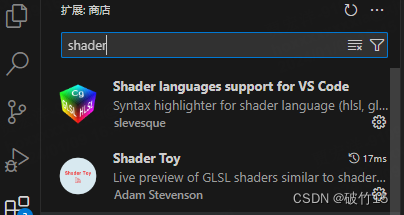shadertoy生成PBR场景教程
发布时间:2024年01月10日
前言
Shadertoy不支持VBO,因此shadertoy下的建模需要借助SDF(符号距离函数)的方式,渲染借助步进式光线追踪(Ray-marching)算法,结合Blinn-Phong或PBR光照模型,渲染场景。
下面是实现效果图:

关键词:
- SDF(符号距离函数)
- Ray-marching算法
- 光照模型:
- Blinn-Phong
- PBR
Shadertoy使用
两种方式使用:
- 在线预览shader:Shadertoy官网
- VSCode安装两个插件,预览shader:

编辑好shader后,右键代码区点击

本文以VSCode下预览shadertoy为例:
添加天空盒
使用iChannelX来加载立方体贴图
#iChannel0 "file://../skybox/skybox_{}.jpg" // Note the wildcard '{}'
#iChannel0::Type "CubeMap"
{}通配符将通过替换为以下任何一组的值来解析
- [ ‘e’, ‘w’, ‘u’, ‘d’, ‘n’, ‘s’ ],
- [ ‘east’, ‘west’, ‘up’, ‘down’, ‘north’, ‘south’ ],
- [ ‘px’, ‘nx’, ‘py’, ‘ny’, ‘pz’, ‘nz’ ]
- [ ‘posx’, ‘negx’, ‘posy’, ‘negy’, ‘posz’, ‘negz’ ].
| CUBE_MAP纹理目标 | 方位 |
|---|---|
| POSITIVE_X | 右 |
| NEGATIVE_X | 左 |
| POSITIVE_Y | 上 |
| NEGATIVE_Y | 下 |
| POSITIVE_Z | 后 |
| NEGATIVE_Z | 前 |
#iChannel0 "file://../skybox/skybox_{}.jpg" // Note the wildcard '{}'
#iChannel0::Type "CubeMap"
const int MAX_MARCHING_STEPS = 255;
const float MIN_DIST = 0.0;
const float MAX_DIST = 100.0;
const float EPSILON = 0.0001;
创建简单sdf模型
球体
/**
* 中心位于原点半径为1的球体的符号距离函数定义
*/
float sphereSDF(vec3 samplePoint) {
return length(samplePoint) - 1.0;
}
立方体
/**
* Signed distance function for a cube centered at the origin
* with width = height = length = 2.0
*/
float cubeSDF(vec3 p) {
// If d.x < 0, then -1 < p.x < 1, and same logic applies to p.y, p.z
// So if all components of d are negative, then p is inside the unit cube
vec3 d = abs(p) - vec3(1.0, 1.0, 1.0);
// Assuming p is inside the cube, how far is it from the surface?
// Result will be negative or zero.
float insideDistance = min(max(d.x, max(d.y, d.z)), 0.0);
// Assuming p is outside the cube, how far is it from the surface?
// Result will be positive or zero.
float outsideDistance = length(max(d, 0.0));
return insideDistance + outsideDistance;
}
CSG (构造实体)操作
/*
* 构造实体形状(CSG)操作
*/
float intersectSDF(float distA, float distB) {
return max(distA, distB);
}
float unionSDF(float distA, float distB) {
return min(distA, distB);
}
float differenceSDF(float distA, float distB) {
return max(distA, -distB);
}
SDF描述场景
/**
* 用SDF描述场景
*/
float sceneSDF(vec3 samplePoint) {
// return sphereSDF(samplePoint);
float sphereDist = sphereSDF(samplePoint ) ;
float cubeDist = cubeSDF(samplePoint);
return intersectSDF(cubeDist, sphereDist);
}
简单的光线追踪算法
/**
* 返回最短距离函数
*
* eye: 射线的起点,可理解为相机
* marchingDirection: 射线的标准化方向向量
* start: 从相机开始的最短距离
* end: 最远距离
*/
float shortestDistanceToSurface(vec3 eye, vec3 marchingDirection, float start, float end) {
float depth = start;
for (int i = 0; i < MAX_MARCHING_STEPS; i++) {
float dist = sceneSDF(eye + depth * marchingDirection);
if (dist < EPSILON) {
return depth;
}
depth += dist;
if (depth >= end) {
return end;
}
}
return end;
}
根据给定的垂直fov大小盒image大小,计算光追视线的方向
/**
* 返回相机的标准化方向向量
*
* fieldOfView: 垂直视野的角度
* size: 输出图像的分辨率
* fragCoord: 输出图像中的像素坐标
*/
vec3 rayDirection(float fieldOfView, vec2 size, vec2 fragCoord) {
vec2 xy = fragCoord - size / 2.0;
float z = size.y / tan(radians(fieldOfView) / 2.0);
return normalize(vec3(xy, -z));
}
sdf距离场下利用距离梯度近似计算物体上某一点的法线
/**
* 对于那些SDF求出来在曲面上的点求标准化的法线向量
*/
vec3 estimateNormal(vec3 p) {
return normalize(vec3(
sceneSDF(vec3(p.x + EPSILON, p.y, p.z)) - sceneSDF(vec3(p.x - EPSILON, p.y, p.z)),
sceneSDF(vec3(p.x, p.y + EPSILON, p.z)) - sceneSDF(vec3(p.x, p.y - EPSILON, p.z)),
sceneSDF(vec3(p.x, p.y, p.z + EPSILON)) - sceneSDF(vec3(p.x, p.y, p.z - EPSILON))
));
}
计算冯氏光照
/**
* Lighting contribution of a single point light source via Phong illumination.
*
* The vec3 returned is the RGB color of the light's contribution.
*
* k_a: 环境色
* k_d: 漫反射颜色
* k_s: 镜面颜色
* alpha: 光泽系数
* p: position of point being lit
* eye: 相机的位置
* lightPos: 光的位置
* lightIntensity: 光的颜色/强度
*
* See https://en.wikipedia.org/wiki/Phong_reflection_model#Description
*/
vec3 phongContribForLight(vec3 k_d, vec3 k_s, float alpha, vec3 p, vec3 eye, vec3 lightPos, vec3 lightIntensity) {
vec3 N = estimateNormal(p);
vec3 L = normalize(lightPos - p);
vec3 V = normalize(eye - p);
vec3 R = normalize(reflect(-L, N));
float dotLN = dot(L, N);
float dotRV = dot(R, V);
if (dotLN < 0.0) {
// Light not visible from this point on the surface
return vec3(0.0, 0.0, 0.0);
}
if (dotRV < 0.0) {
// Light reflection in opposite direction as viewer, apply only diffuse
// component
return lightIntensity * (k_d * dotLN);
}
return lightIntensity * (k_d * dotLN + k_s * pow(dotRV, alpha));
}
计算多个点光源的冯氏光照颜色
/**
* Lighting via Phong illumination.
*
* The vec3 returned is the RGB color of that point after lighting is applied.
* k_a: 环境色
* k_d: 漫反射颜色
* k_s: 镜面颜色
* alpha: 光泽系数
* p: position of point being lit
* eye: 相机的位置
*
* See https://en.wikipedia.org/wiki/Phong_reflection_model#Description
*/
vec3 phongIllumination(vec3 k_a, vec3 k_d, vec3 k_s, float alpha, vec3 p, vec3 eye) {
const vec3 ambientLight = 0.5 * vec3(1.0, 1.0, 1.0);
vec3 color = ambientLight * k_a;
vec3 light1Pos = vec3(4.0 * sin(iTime),2.0, 4.0 * cos(iTime));
vec3 light1Intensity = vec3(0.4, 0.4, 0.4);
color += phongContribForLight(k_d, k_s, alpha, p, eye, light1Pos, light1Intensity);
vec3 light2Pos = vec3(2.0 * sin(0.37 * iTime),
2.0 * cos(0.37 * iTime),
2.0);
vec3 light2Intensity = vec3(0.4, 0.4, 0.4);
color += phongContribForLight(k_d, k_s, alpha, p, eye,
light2Pos,
light2Intensity);
return color;
}
相机的LookAt矩阵
/**
* Return a transform matrix that will transform a ray from view space
* to world coordinates, given the eye point, the camera target, and an up vector.
*
* This assumes that the center of the camera is aligned with the negative z axis in
* view space when calculating the ray marching direction. See rayDirection.
*/
mat4 viewMatrix2(vec3 eye, vec3 center, vec3 up) {
// Based on gluLookAt man page
vec3 f = normalize(center - eye);
vec3 s = normalize(cross(f, up));
vec3 u = cross(s, f);
return mat4(
vec4(s, 0.0),
vec4(u, 0.0),
vec4(-f, 0.0),
vec4(0.0, 0.0, 0.0, 1)
);
}
const float PI = 3.14159265359;
BRDF
法线分布函数
float DistributionGGX(vec3 N, vec3 H, float roughness)
{
float a = roughness*roughness;
float a2 = a*a;
float NdotH = max(dot(N, H), 0.0);
float NdotH2 = NdotH*NdotH;
float nom = a2;
float denom = (NdotH2 * (a2 - 1.0) + 1.0);
denom = PI * denom * denom;
return nom / denom;
}
几何函数(阴影遮蔽)
float GeometrySchlickGGX(float NdotV, float roughness)
{
float r = (roughness + 1.0);
float k = (r*r) / 8.0;
float nom = NdotV;
float denom = NdotV * (1.0 - k) + k;
return nom / denom;
}
// ----------------------------------------------------------------------------
float GeometrySmith(vec3 N, vec3 V, vec3 L, float roughness)
{
float NdotV = max(dot(N, V), 0.0);
float NdotL = max(dot(N, L), 0.0);
float ggx2 = GeometrySchlickGGX(NdotV, roughness);
float ggx1 = GeometrySchlickGGX(NdotL, roughness);
return ggx1 * ggx2;
}
菲涅尔方程
vec3 fresnelSchlick(float cosTheta, vec3 F0)
{
return F0 + (1.0 - F0) * pow(clamp(1.0 - cosTheta, 0.0, 1.0), 5.0);
}
生成光源位置和颜色
// lights
vec3 lightPositions[2];
vec3 lightColors[2];
void updateLight(){
lightPositions[0] = vec3(4.0 * sin(iTime),2.0, 4.0 * cos(iTime));
lightColors[0] = vec3(1.0, 0., 0.);
lightPositions[1] = vec3(2.0 * sin(0.37 * iTime),
2.0 * cos(0.37 * iTime),
2.0);
lightColors[1] = vec3(1.0, 1.0, 0);
}
pbr材质参数
vec3 albedo=vec3(0.3f, 1.0f, 0.f);
float metallic = 0.7f;
float roughness = 0.3f;
float ao = 0.7f;
计算pbr颜色
void pbrColor(out vec4 FragColor,
in vec3 WorldPos,
in vec3 Normal,
in vec3 camPos
){
vec3 N = normalize(Normal);
vec3 V = normalize(camPos - WorldPos);
// calculate reflectance at normal incidence; if dia-electric (like plastic) use F0
// of 0.04 and if it's a metal, use the albedo color as F0 (metallic workflow)
vec3 F0 = vec3(0.04);
F0 = mix(F0, albedo, metallic);
// reflectance equation
vec3 Lo = vec3(0.0);
for(int i = 0; i < 2; ++i)
{
// calculate per-light radiance
vec3 L = normalize(lightPositions[i] - WorldPos);
vec3 H = normalize(V + L);
float distance = length(lightPositions[i] - WorldPos);
float attenuation = 1.0 / (distance * distance);
vec3 radiance = lightColors[i] * attenuation;
// Cook-Torrance BRDF
float NDF = DistributionGGX(N, H, roughness);
float G = GeometrySmith(N, V, L, roughness);
vec3 F = fresnelSchlick(clamp(dot(H, V), 0.0, 1.0), F0);
vec3 numerator = NDF * G * F;
float denominator = 4.0 * max(dot(N, V), 0.0) * max(dot(N, L), 0.0) + 0.0001; // + 0.0001 to prevent divide by zero
vec3 specular = numerator / denominator;
// kS is equal to Fresnel
vec3 kS = F;
// for energy conservation, the diffuse and specular light can't
// be above 1.0 (unless the surface emits light); to preserve this
// relationship the diffuse component (kD) should equal 1.0 - kS.
vec3 kD = vec3(1.0) - kS;
// multiply kD by the inverse metalness such that only non-metals
// have diffuse lighting, or a linear blend if partly metal (pure metals
// have no diffuse light).
kD *= 1.0 - metallic;
// scale light by NdotL
float NdotL = max(dot(N, L), 0.0);
// add to outgoing radiance Lo
Lo += (kD * albedo / PI + specular) * radiance * NdotL; // note that we already multiplied the BRDF by the Fresnel (kS) so we won't multiply by kS again
}
// ambient lighting (note that the next IBL tutorial will replace
// this ambient lighting with environment lighting).
vec3 ambient = vec3(0.03) * albedo * ao;
vec3 color = ambient + Lo;
// HDR tonemapping
color = color / (color + vec3(1.0));
// gamma correct
color = pow(color, vec3(1.0/2.2));
FragColor = vec4(color, 1.0);
}
void mainImage( out vec4 fragColor, in vec2 fragCoord )
{
updateLight();
vec3 viewDir = rayDirection(45.0, iResolution.xy, fragCoord);
vec3 eye = vec3(8.0, 5.0, 7.0);
mat4 viewToWorld = viewMatrix2(eye, vec3(0.0, 0.0, 0.0), vec3(0.0, 1.0, 0.0));
vec3 worldDir = (viewToWorld * vec4(viewDir, 0.0)).xyz;
float dist = shortestDistanceToSurface(eye, worldDir, MIN_DIST, MAX_DIST);
//skybox
vec2 uv=(fragCoord-.5*iResolution.xy)/iResolution.y;
vec4 s=vec4(0.,0.,2.,1.);
float t=iTime*.5;
vec3 cam_pos=s.xyz+vec3(sin(t),0.,cos(t))*5.;
vec3 cam_dir=normalize(s.xyz-cam_pos);
vec3 cam_r=-cross(cam_dir,vec3(0,1,0));
vec3 cam_u=-cross(cam_r,cam_dir);
vec3 r=normalize(uv.x*cam_r+uv.y*cam_u+1.*cam_dir);
// r= normalize();
if (dist > MAX_DIST - EPSILON) {
// Didn't hit anything
fragColor =texture(iChannel0,r);
return;
}
// The closest point on the surface to the eyepoint along the view ray
vec3 p = eye + dist * worldDir;
//冯氏光照
vec3 K_a = vec3(0.2, 0.2, 0.2);
vec3 K_d = vec3(0.7, 0.2, 0.2);
vec3 K_s = vec3(1.0, 1.0, 1.0);
float shininess = 10.0;
vec3 color = phongIllumination(K_a, K_d, K_s, shininess, p, eye);
fragColor = vec4(color, 1.0);
//pbr
pbrColor(fragColor,p,estimateNormal(p),eye);
}
理论知识可查看前面两篇文章
参考链接
SDF
https://iquilezles.org/articles/distfunctions/
https://iquilezles.org/articles/distfunctions2d/
Ray-marching
http://www.scratchapixel.com/lessons/3d-basic-rendering/introduction-to-ray-tracing/how-does-it-work
PBR辐射度量学
https://www.pbr-book.org/3ed-2018/Color_and_Radiometry/Radiometry
Shadertoy官网
http://shadertoy.com/
文章来源:https://blog.csdn.net/qq_40500571/article/details/135483209
本文来自互联网用户投稿,该文观点仅代表作者本人,不代表本站立场。本站仅提供信息存储空间服务,不拥有所有权,不承担相关法律责任。 如若内容造成侵权/违法违规/事实不符,请联系我的编程经验分享网邮箱:chenni525@qq.com进行投诉反馈,一经查实,立即删除!
本文来自互联网用户投稿,该文观点仅代表作者本人,不代表本站立场。本站仅提供信息存储空间服务,不拥有所有权,不承担相关法律责任。 如若内容造成侵权/违法违规/事实不符,请联系我的编程经验分享网邮箱:chenni525@qq.com进行投诉反馈,一经查实,立即删除!
最新文章
- Python教程
- 深入理解 MySQL 中的 HAVING 关键字和聚合函数
- Qt之QChar编码(1)
- MyBatis入门基础篇
- 用Python脚本实现FFmpeg批量转换
- JAVA实现ZIP压缩下载文件+ZIP添加多文件
- java中反射与底层框架的编写
- vue中key的用法
- 《JVM由浅入深学习【三】 2023-12-23》JVM由简入深学习提升
- 众和策略股市行情分析:创业板股票有什么特点?
- HTTPS加密:保障网络安全的重要一环
- 易用、高效、可靠!高精度组合定位系统P-Box测试解决方案
- 在接触新的游戏引擎的时候,如何能快速地熟悉并开发出一款新游戏?
- 第八章 使用matplotlib绘制高级图表
- “Unexpected side effect in computed function“在计算属性中修改响应式数据报错